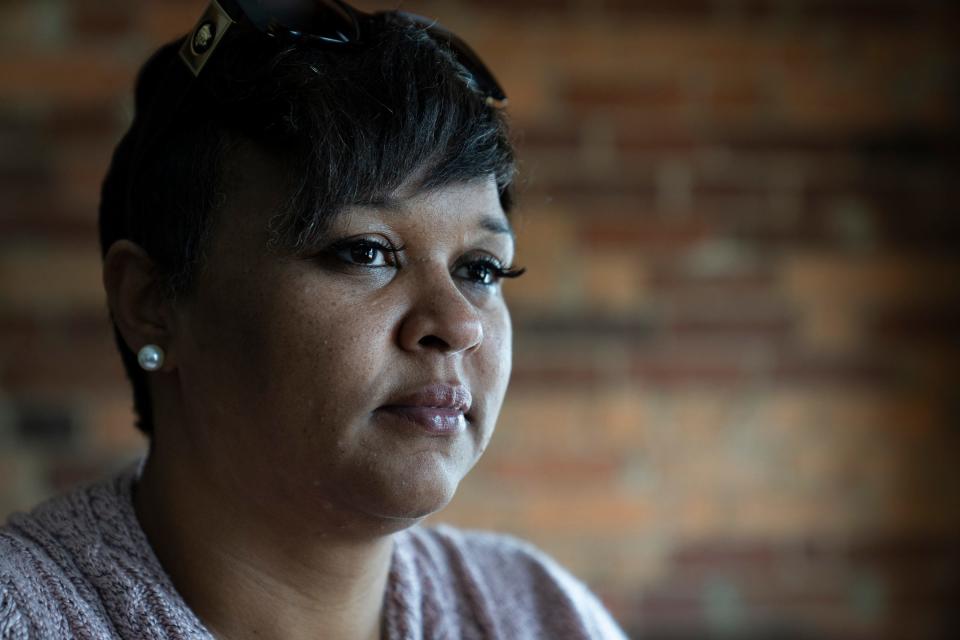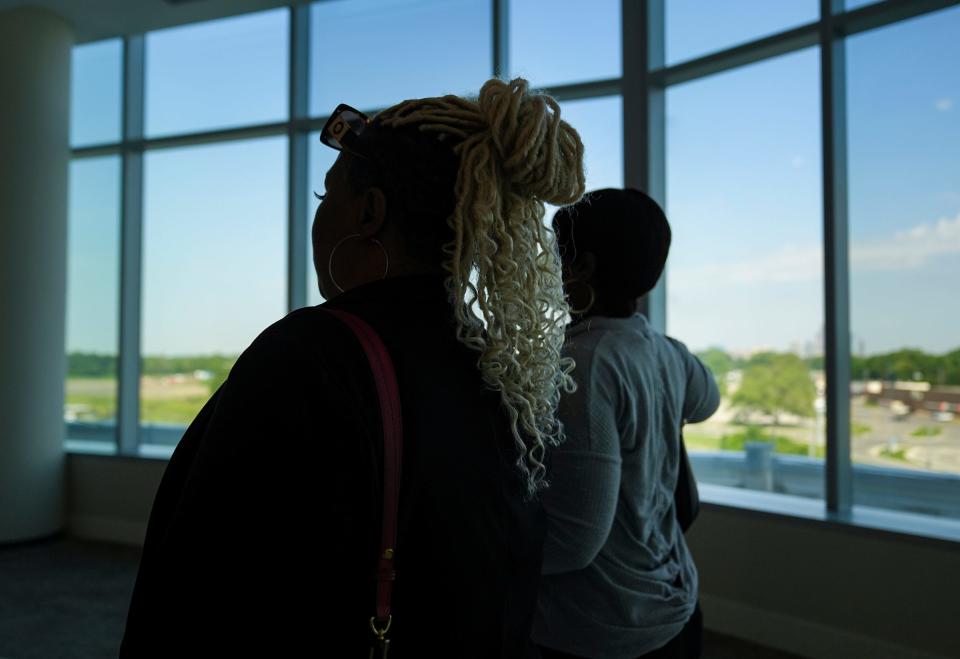Sunglasses to survival: Indy woman wants to help you stop hiding abuse
This story contains mention of domestic violence. Abuse can be reported by calling the National Domestic Violence Hotline at 1-800-799-7233 (SAFE) or 1-800-787-3224 (TTY).
A dozen or so pairs of sunglasses hang from a rack on Danyette Smith’s bedroom wall.
When the 40-year-old chooses a pair to wear each day, it’s not to block sunlight. Nor are they a fashion statement. Often, she doesn’t even wear them over her eyes.
Smith perches a pair on top of her head every morning as a poignant reminder of how far she’s come.
Her oldest pair came after the first black eye. They hid the blooming bluish-purple blots from her then-partner's punches. She had just landed what was then her highest-paying job, a gig that paid $12/hour in Carmel, and didn’t want to jeopardize her opportunity. The attempt didn’t work – her boss told her to take some time off to heal after seeing her injuries. Smith found herself stuck again at home with her abuser, not knowing how to escape and land on her feet with two daughters younger than 10.
So when the next black eye came, she just bought another pair of sunglasses.
The cycle continued and the collection grew. Pair after pair of sunglasses racked up until her selection resembled closer to what it looks like today − a mix of styles including magenta shades, a blue pair, aviators and dark oversized frames.

Smith escaped her violent relationship nearly 10 years ago, though her sunglasses remain. Now they mean something entirely different.
Her glasses are a cue to her clients, many of them Indianapolis women who are in the throes of the same abuse she suffered. The shades signal she knows what they’re going through.
“They’re hiding behind their sunglasses. Mine are on my head,” she explained. “I want them to know when I hear their story, I understand.”
The small gesture is symbolic of how Smith has approached her career helping Indianapolis families since leaving her abuser, according to her allies. Her experience compelled her to launch a successful nonprofit, Silent No More, to provide services for people going through abuse. It's also what prompts her to drop everything if a domestic violence death occurs in the city, making time to visit the family and talk to local media about available resources.
Smith puts it this way: She wants to be the person she needed back then. She didn't know she was experiencing domestic abuse until she read her old college essays defining intimate partner violence one day and slowly realized the definitions matched her home life. She didn't realize preventing someone from getting a job is a form of abuse. And when the relationship became so bad she finally went to the courthouse to get a protection order, she couldn't muster enough strength to complete the process the first time.
All the while, the abuse became more and more violent − culminating in a gun pointed at her head. The trigger wasn't pulled, but the punches didn't stop. Two metal plates hold her eye socket together to this day.
Preventing the same from happening to other women motivates her every morning to continue the grueling work.
That drive is one of the main reasons top city government leaders asked her to take on a never-before-seen position for Indianapolis — a person solely dedicated to preventing domestic violence. The position required someone tough but sensitive to survivors, and passionate above all.
"I think a lot of people can be really good at jobs and people can learn how to work in certain areas, but not everybody has that passion and spark,” said Lauren Rodriguez, deputy mayor of Public Health and Safety, who was one of many people involved in Smith’s hiring.
Since starting the job early last year, Smith has essentially become the city's one-stop shop for anyone going through domestic violence. She oversees three employees who function like social workers for their clients. The job encompasses a little of everything, like consulting survivors through a protection order, educating neighborhoods identified as high-risk, or serving as the connective tissue between fellow aid agencies.
It’s a gargantuan task for Smith’s small team, which she named the Indy Champions. Particularly at a time when people killed from domestic violence in Indiana during the span of a year recently jumped as high as 180%. Smith is acutely aware of the domestic homicide rate and how the overwhelming majority are conducted with firearms.
Her supporters have no doubt she's up for the task ahead. She's made a name for herself from her nonprofit work alone, they say. Her approachable nature and intimate knowledge only carried by someone who's gone through abuse, they say, will help her reach the most vulnerable.
The city's go-to helper for domestic violence
Indianapolis had just recorded its bloodiest year in history when Smith launched the Indy Champions.
Nearly 250 homicides were on the books. Many stemmed from domestic or intimate partner violence. The Covid-19 pandemic affected those numbers, but when lockdown orders lifted across the country, Indiana didn't see the same corresponding drop in killings by a family member or partner as other states.
Deeply worried about the numbers, city government leaders and advocates brainstormed ways to save lives. The city had an unprecedented opportunity with millions of federal dollars they could steer toward combatting rising crime. When it came to domestic violence, the city already offered prosecutors, social workers and victim-witness assistance programs. They wanted to know what more needed to be done.
Smith was the first person who came to mind as a resource, Rodriguez said. She and others reached out asking for a meeting over boba tea, a request both Smith and Rodriguez laugh about now as out-of-the-blue and mysterious in hindsight.
They, along with Deputy Mayor Judith Thomas and Deputy Director Carlette Duffy, sat down and asked about survivors’ needs and, eventually, asked if she could take the job.
Smith hesitated. At that point, Silent No More had gone from a start-up to a thriving nonprofit. Taking the city's job meant she'd have to step down as executive director. Entering a quasi-government position meant a public spotlight and handling taxpayer money.
Smith said she asked multiple questions and ended the meeting telling them she'd mull it over. She went home, prayed and found her answer.
"It was like God saying, ‘This isn’t about you. This is about the city, and the impact you will be able to make will be so much greater than where you are today,’” she said. “And that’s when I was like, OK. I accept.”
For the next year, Smith built her team of Indy Champions, all of whom are domestic violence survivors, under the Indy Public Safety Foundation.
Perhaps the most crucial part of her job is serving as a liaison between the abused and the agencies. Smith learned from her own experience how hard it is to escape while keeping yourself, and your kids, safe. In those moments, which experts consider the most dangerous time for a survivor, people fleeing don't have time to call "20, 10, or even five" places, Smith said.
Indianapolis needed someone to streamline the process so survivors had one number to call for every resource they can think of versus several.
The city has several agencies willing to help, as explained by Rachel Scott, president and CEO of Coburn Place, though more assistance is always needed. To her, Smith serves as the crucial mortar ensuring organizations like hers work together, versus in silos. She gave the example of Smith starting monthly meetings with domestic violence prevention leaders to learn what each needs.
Coburn Place soon later asked Smith to join their board after it became clear she liked to roll up her sleeves.
"She's not passive whatsoever," Scott said.
Breaking the cycle
Well over a year after that conversation, Smith stood at the front of a classroom-like space on the east side of Indianapolis with 20 or so high school students on summer break.
She handed each of them packets labeled with the topic of the day: dating violence.
The seminar fell in a ZIP code identified by Smith as an area highly impacted by domestic violence. She started these classes to stop the cycle before it started.

Smith clicked through a few PowerPoint slides, then threw out a hypothetical scenario.
"This is for the ladies in the room," she started. "You get a FaceTime from a friend and she's got bruises from her boyfriend. But she told you not to tell her mom because she doesn't approve of her dating right now. What do y'all do?"
A couple of moments of silence ensued. Then, a girl in the back chimed in and said she’d tell her own mother, who could provide guidance.
Smith nodded. She turned to the rest of the class so others could share.
“What would some of you do?” She asked.
“Buy a gun.”
The answer came from another girl in the class.
“Buy a gun?” Smith asked. Her matter-of-fact tone remained unwavering in the face of a grave response.
The teen affirmed her answer.
Smith didn't jump into a lecture. She told the students at the onset that no answer was the wrong answer. But in this case, she took the opportunity to offer clarity.
“So now you got a gun,” Smith said. “You get locked up and you’re ruining your whole life. And it goes downhill from there because you’re reacting out of anger because they hit your friend.”
Smith told the class she’s heard this answer several times — and even lived through something similar. She told the teens she didn’t tell her brothers about her abuse while she went through it, fearing they might react strongly.
“Don’t buy the gun,” she said, gently smiling. “Go to a trusted adult.”
A few members of the class scribbled in their notebooks.
City Councilor La Keisha Jackson, Smith's ally who represents the district where the seminar took place, said more teens are witnessing domestic violence and even going through the abuse themselves, making what was revealed in the seminar unsurprising.
What is uncommon, she said, is for people who have seen brushes of abuse to open up about it. Jackson said Smith, as seen in that moment, is approachable enough for people to feel like they can.
“Danyette has that way of opening people up and relating to them,” she said. "Victims of domestic violence have to be able to trust you are a person there to assist them."

Full circle
Smith pulled into the vast parking lot of the Community Justice Campus in southeast Indianapolis shortly before 9 a.m. on a hot day in July.
Outside the massive building, which houses the county's courtrooms, she awaited the arrival of a woman seeking a protection order against her now-former partner. Smith would escort her to the courtroom and sit in on the hearing to help interpret the sometimes complicated legal processes. Smith is also there because it can be a matter of life or death.
Some of her clients have been attacked by their abusers while walking to the building. It hasn’t happened since Smith started walking people inside.
When the woman arrived in the Uber, the pair walked through metal detectors. They traversed the winding halls down to the courtroom. Before entering the wide double doors, the woman asked Smith what she was about to experience inside as she stood in front of the judge. She felt like her situation was out of her control.
Smith, sunglasses perched on her head, talked down her fears.
"You're in control."
Find help: Here's where to find housing, advocacy and counseling resources in Central Indiana for abuse
Contact reporter Sarah Nelson at 317-503-7514 or sarah.nelson@indystar.com
This article originally appeared on Indianapolis Star: Danyette Smith draws from within to stop Indianapolis domestic violence

